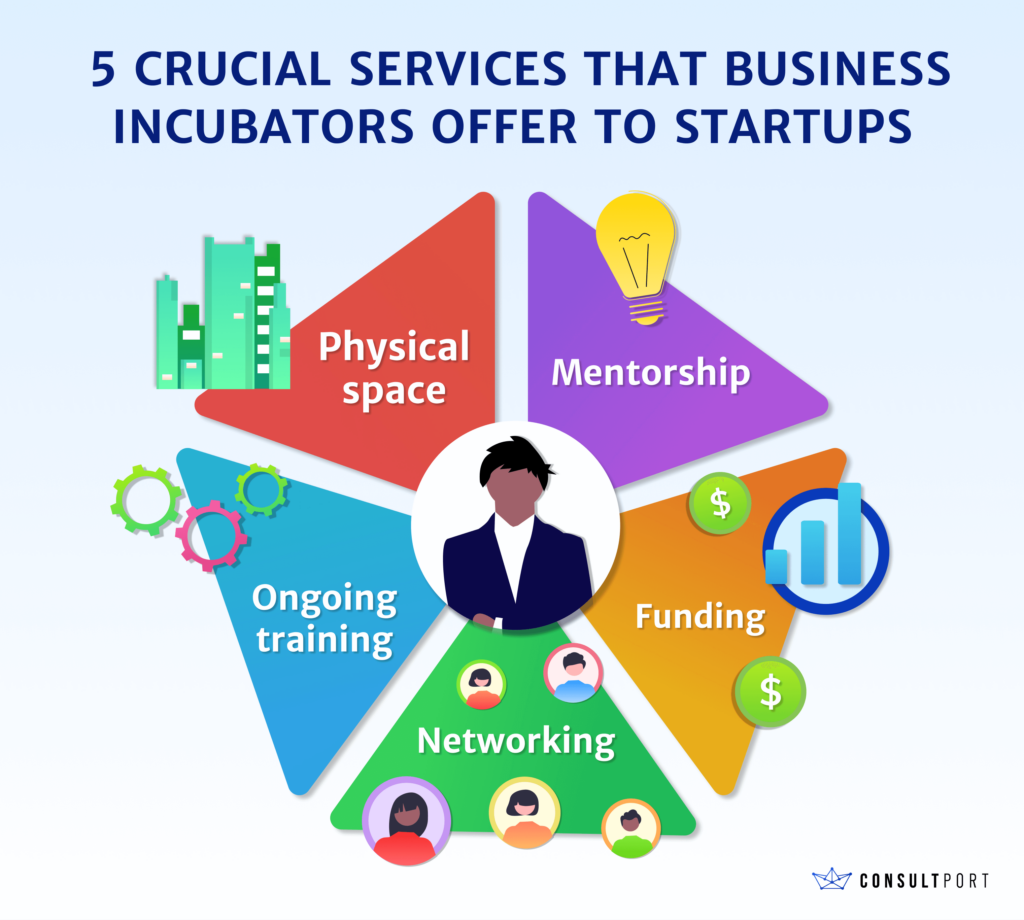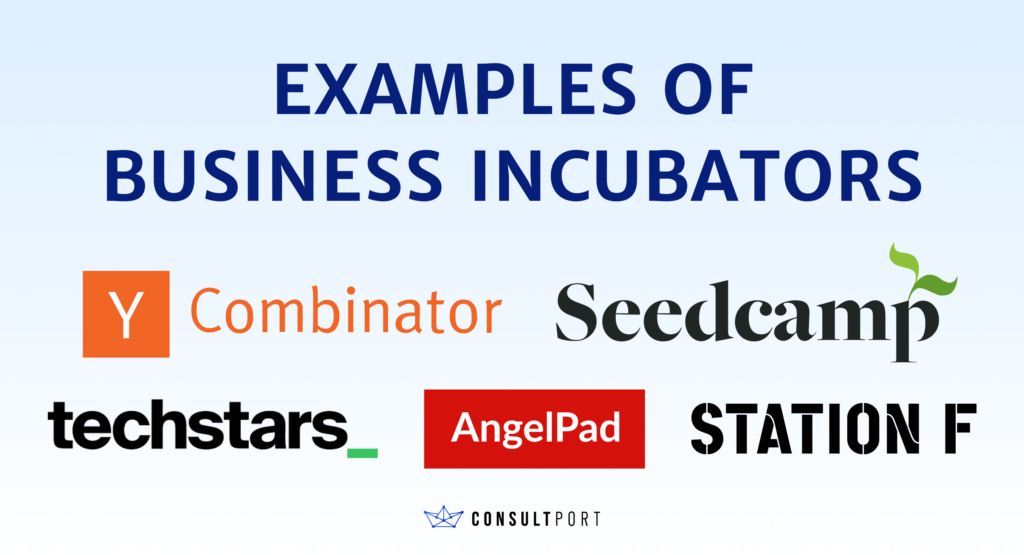5 Ways Business Incubators Turn Startups Into Fortune 500 Companies
Blog Categories:
Published:
December 18, 2023
Reading Time:
6 minutes

Have you ever wondered about the magic behind successful startup stories? How come some entrepreneurs who start in a garage or their bedroom become so successful?
Enter the world of business incubators—the playground for startups that offer indispensable support to navigate the challenging early stages of business development. A business incubator is not just a space—it's a strategic initiative designed to accelerate the growth and success of startups.
In this article, we’ll discuss how business incubators turn small startups into Fortune 500 companies. We’ll also discuss real-life examples of business incubators and accelerators that are helping thousands of startups grow. Whether you’re an entrepreneur behind a startup or a veteran who wants to start an incubator program, this article is for you.
So, let’s dive into it.
Enter the world of business incubators—the playground for startups that offer indispensable support to navigate the challenging early stages of business development. A business incubator is not just a space—it's a strategic initiative designed to accelerate the growth and success of startups.
In this article, we’ll discuss how business incubators turn small startups into Fortune 500 companies. We’ll also discuss real-life examples of business incubators and accelerators that are helping thousands of startups grow. Whether you’re an entrepreneur behind a startup or a veteran who wants to start an incubator program, this article is for you.
So, let’s dive into it.
KEY TAKEAWAYS
- Business incubators act as nurturing grounds for startups and provide support during the challenging early stages.
- Business accelerators, on the other hand, aim to expedite the growth of more established startups.
- Some services offered by incubators include physical space, funding, training, mentorship, and networking opportunities.
- Some well-known incubators and accelerators are as follows: Y Combinator, AngelPad, Techstars, Seedcamp, and Station F.
What Is a Business Incubator?
Imagine this: A group of ambitious entrepreneurs are sitting in a shared office space, actively working on their innovative ideas. They are determined to build something new and groundbreaking. And one day, they’ll join the likes of Jeff Bezos, Elon Musk, and Steve Jobs. Well, this scene is not just a random gathering but a snapshot of a business incubator in action. Business incubators are like nurturing grounds for startups, providing them with the essential support needed to navigate the challenging early stages of business development.
To put it more formally, a business incubator is an organization or program designed to accelerate the advancement and success of startups through a range of resources and services. These resources typically include a physical workspace, mentorship, monetary help, networking opportunities, and a range of business development services. Simply put, the primary goal of a business incubator is to facilitate the development of young companies during their formative stages.
Also, it’s important to mention that even though the terms "accelerator" and "incubator" are often used interchangeably, there are distinctions between them. Incubators typically focus on the early stages while accelerators focus on startups that are further along and aim to accelerate their growth. Further in the article, we’ll discuss both.

Also, co-locating startups within the same space fosters an atmosphere where innovative ideas from like-minded people can flourish through spontaneous interactions.

The provision of seasoned mentors and advisors within business incubators stands as a cornerstone in the journey of startups. This is because mentors offer a reservoir of invaluable experience and guidance. These mentors, often industry veterans or successful entrepreneurs themselves, steer startups through challenges and aid in strategic decision-making.
You see, many times, it’s not easy to turn a startup into success without the financial blessings of a business incubator. Incubators act as catalysts for fundraising efforts by leveraging their extensive networks and industry connections. This strategic facilitation significantly enhances startups' chances of capturing the attention of new investors who see their potential.

Networking opportunities within business incubators represent a linchpin in the entrepreneurial ecosystem. This is because they provide startups with access to a rich tapestry of connections that extend beyond the conventional bounds of professional relationships. Incubators are where strong alliances can be forged and history-making partnerships can be formed. Never underestimate the power of incubators to bring the right people together.

To put it more formally, a business incubator is an organization or program designed to accelerate the advancement and success of startups through a range of resources and services. These resources typically include a physical workspace, mentorship, monetary help, networking opportunities, and a range of business development services. Simply put, the primary goal of a business incubator is to facilitate the development of young companies during their formative stages.
Also, it’s important to mention that even though the terms "accelerator" and "incubator" are often used interchangeably, there are distinctions between them. Incubators typically focus on the early stages while accelerators focus on startups that are further along and aim to accelerate their growth. Further in the article, we’ll discuss both.
5 Crucial Services That Business Incubators Offer to Startups
Now that you have a basic understanding of business incubators and how they work, let’s dive a little deeper and understand the services they provide in detail.
1. Physical space
This could be an office in a high-rise building or a decent room in a coworking place. You see when a new innovative company is just starting up, it may be difficult to afford to rent an office. Moreover, the physical workspace within an incubator is more than just a place to work—it's a breeding ground for collaboration.Also, co-locating startups within the same space fosters an atmosphere where innovative ideas from like-minded people can flourish through spontaneous interactions.
2. Mentorship
According to a survey by UPS, a whopping 70% of small business owners who take guidance from mentors survive at least five years or more. This shouldn’t be surprising because business is very similar to boxing—everybody has a plan until they get punched in the face, as Mike Tyson said. So, having mentors really helps.
The provision of seasoned mentors and advisors within business incubators stands as a cornerstone in the journey of startups. This is because mentors offer a reservoir of invaluable experience and guidance. These mentors, often industry veterans or successful entrepreneurs themselves, steer startups through challenges and aid in strategic decision-making.
3. Funding
Well, this is probably the most important function of business incubators. According to research by Semrush, 66% of small businesses face financial challenges and 43% of them claim that operational expenses are the biggest headache. Furthermore, 40% of small enterprises suffer from debts of $100,000 or more.You see, many times, it’s not easy to turn a startup into success without the financial blessings of a business incubator. Incubators act as catalysts for fundraising efforts by leveraging their extensive networks and industry connections. This strategic facilitation significantly enhances startups' chances of capturing the attention of new investors who see their potential.
4. Networking
A startup could have the most innovative and life-changing idea, but without the support of the right network, it may not be able to take off. As bestselling author Jay Samit said, “No first-time entrepreneur has the business network of contacts needed to succeed. An incubator should be well integrated into the local business community and have a steady source of contacts and introductions.”
Networking opportunities within business incubators represent a linchpin in the entrepreneurial ecosystem. This is because they provide startups with access to a rich tapestry of connections that extend beyond the conventional bounds of professional relationships. Incubators are where strong alliances can be forged and history-making partnerships can be formed. Never underestimate the power of incubators to bring the right people together.
5. Ongoing training
While running a startup, entrepreneurs may find themselves in a place where upskilling becomes necessary. That’s why training sessions provided within business incubators go beyond the conventional scope of startup support. These learning opportunities are crafted to teach entrepreneurs skills such as strategic planning and decision-making, market research and analysis, effective communication, branding, operational efficiency, leadership, team management, and much more.Examples of Business Incubators
Alright, now that you know how business incubators can be a lifeline for new startups, let’s take a look at real-life examples of business incubators as well as accelerators that are changing the business world.
1. Y Combinator
Y Combinator is one of the most well-known and successful startup accelerators in the world. Launched in March 2005, it provides seed funding, advice, and connections in exchange for equity. Did you know that successful companies like Dropbox, Airbnb, and Reddit, have emerged from Y Combinator? Truly, you should keep an eye on this one.2. AngelPad
Founded in 2010 by ex-Googlers, AngelPad provides selected startups with mentorship, funding, and access to a robust network of industry experts and investors. It is a seed-stage incubator that provides funding and mentorship to startups. Well, it also has a strong track record, with successful alumni such as Postmates and Buffer.3. Techstars
Techstars is a pre-seed investor that provides funding, mentorship, and resources to early-stage companies. It offers a three-month program to selected startups, providing them with funding, mentorship, and access to a vast network of investors and industry professionals. Startups accepted into Techstars not only receive financial support but also benefit from the expertise and guidance of experienced mentors. As of December 2023, the company has invested in more than 3,700 early-stage startups.4. Seedcamp
Seedcamp is a European-based seed-stage fund and accelerator that has been supporting early-stage startups since 2007. With a diverse portfolio spanning various industries, Seedcamp provides funding, mentorship, and a platform for startups to connect with a huge network of investors and mentors. The company even calls itself “Europe’s seed fund” on the website. So, for all startups in Europe, this one is a gift.5. Station F
Again, if you're based in Europe, you should know that Station F stands as the world's largest startup campus, situated in Paris, France. It has 30 startup programs, 35 public administrations, 150 VC funds, 4 mentorship offices, and 600 events per year. This unique initiative was founded by the French billionaire Xavier Niel and offers a diverse ecosystem for startups. With the vision of empowering the next generation of entrepreneurs, Station F is likely to be behind many successful companies in the future.Conclusion
Business incubators and accelerators are truly life-saving for thousands of startups around the world that have potential. Remember that big companies like Apple and Amazon started in a garage? But those days are gone. Nowadays, startups have access to dozens of incubators around the world to support their journey. If you have a startup, then you should find the best incubator to fuel your growth.
And if you’re a business that wants to support startups, then Consultport has something for you, too. Our corporate incubator consultants guide you through the process of creating and operating internal or external incubator programs. With their strategic advice, these consultants can help your company establish and manage incubators seamlessly. Furthermore, we guide you in effectively allocating resources, making sure your investments in incubators are directed toward the most promising areas of your business. We have over 10,000 consultants in our talent pool—all of whom have worked for top consulting firms or blue-chip companies. If you want experienced and senior experts to handle your incubator programs, get in touch with us now.
And if you’re a business that wants to support startups, then Consultport has something for you, too. Our corporate incubator consultants guide you through the process of creating and operating internal or external incubator programs. With their strategic advice, these consultants can help your company establish and manage incubators seamlessly. Furthermore, we guide you in effectively allocating resources, making sure your investments in incubators are directed toward the most promising areas of your business. We have over 10,000 consultants in our talent pool—all of whom have worked for top consulting firms or blue-chip companies. If you want experienced and senior experts to handle your incubator programs, get in touch with us now.
Share This Story, Choose Your Platform!




